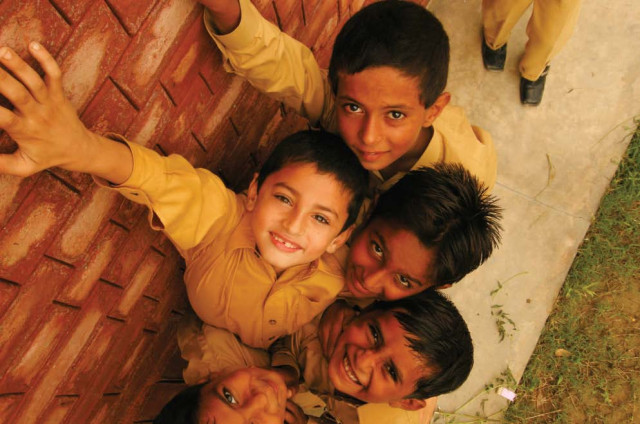Rooting out illiteracy
Despite hurdles, civic educational initiatives are changing lives of underprivileged students.

Nabila, Zahoor and Majida faced the same problem that many of their peers in government-run schools do: they lacked the means to pursue higher education.
But things took a fortunate turn for these ambitious yet underprivileged children. Nabila, who hails from a typical Punjabi family from Minhalla, is now the first member of her family to study to complete her Masters while Zahoor Ahmed from Mauribad has realised his dream of being an electrical engineer. And 14-year-old Majida, after losing her home and family members during the devastating floods in Shahdad Kot, is now able to read and write Urdu.
There are similar other narratives of how students, hampered by financial shortfalls, were given a chance to get educated. For instance, students of Sindh Madrassa Board (SMB) Fatima Jinnah — previously considered a substandard institution — now have the resources and teachers to compete aside the top league of school in Karachi.
The mushrooming of non-governmental organisations and community-based initiatives in the field of education has made these success stories possible. However, the offer for free or subsidised provision of education hardly attracted scores of eager students to these institutions.
In a country where children and women are often fraught with the obligation to financially support their families, even the opportunity of acquiring education gratis is not attractive. Yet despite the odds, the perseverance of the people behind these initiatives helped them survive and achieve the tall order of educating Pakistan’s poor youth.
Quality education in rural and sub-urban areas
The Citizen’s Foundation (TCF), founded with the aim of removing barriers of class and privilege in educational opportunities, apparently struggles every time it is setting up a new school. “We may be an established and reputable name now but the location populations of areas we target are not aware of our existence,” explains TCF’s area manager Syed Nayab Shah.
Referring to his experience of setting up a school in Keti Bunder — a small port town located in Karachi East — he reveals that the most important task after setting up all modalities is ensuring adequate enrollment.
“Why would a family send a potential breadwinner to school?” he questions. “We use examples of educated, successful people from the same community to convince parents to send their children to school.”
Today TCF, which started in 1995, has 730 purpose-built school units nationwide with an impressive enrollment of 102,000 students. The organisation emphasises on career guidance, a modern balanced curriculum and extra-curricular activities to empower its students to compete in all walks of life.
Reforming public schooling
Zindagi Trust, founded by musician-turned-philanthropist Shehzad Roy, adopted SMB Fatima Jinnah Government Girls’ School in 2007. Subsequently, the espousal triggered sweeping reforms to revamp the outdated public institution. The objective was to turn it into a centre of excellence with the hope that government would replicate the model all over Pakistan.
“We replaced government text books with modern ones which enable students to think independently,” says in Shehzad Roy. Moreover, extracurricular activities were made a mandatory feature of the educational program.
Just six months after Zindagi Trust adopted the SMB institution, one of its students won a bronze medal in the 2008 Inter-school Education Olympiad art competition and the school’s rowing team won at the Inter schools Regatta 2008. Currently, Zindagi Trust is sponsoring education of over 2800 children across Pakistan.
Targeting girls’ education
Nearly 41 per cent of girls in Pakistan fail to finish primary education. Thus Oxfam GB decided to remedy the situation by founding the Girls’ Education Program in 2006. Yet getting girls to attend this program proved to be a Herculean task.
Parents simply did not feel the need to educate their daughters. Program coordinator Saeed Ul Hassan says that the organisation had to visit households in communities to convince them to send their girls to school.
“We would tell them that educated mothers make better mothers,” he explains. The organisation faced many other bottlenecks in attracting female students, like the dearth of female teachers.
Currently, Oxfam GB’s educational initiative is currently targeting 105,000 girls in about 250 to 300 schools in four districts of Southern Punjab and two flood affected district of Sindh.
Educating the flood affectees
When Yasmeen Nigar, an educationist, opened her first school for providing free education in New Karachi in 1981, she was dismayed at the lack of student enrollment. She had to visit almost every household located in the Pathan and Punjabi majority areas, to convince families that their daughters would be safe with her.
She is currently providing education to the destitute children, who were affected by last year’s floods, settled in the camps lining the Super Highway. Yasmeen daily transports these children to her own Brittanica School in Surjani town using rented vans every day.
Unique grassroots initiatives
The mobile school is a unique grass-root initiative in the field of education. Such a school bus, which has its interior designed like a classroom with benches and textbooks, educates children of Karachi’s Neelum Colony. Additionally, Shabina Mustafa is running an excellent school in the garage of her own home in Clifton.
The size of these interventions may seem as minute and trivial but adequately educating one child has the potential to change an entire family’s future.
All these initiatives show that Pakistan’s state might have given up on its burgeoning population of children, but civil society has not. They are, albeit on a modest scale, transforming society.
Published in The Express Tribune, September 8th, 2011.



















COMMENTS
Comments are moderated and generally will be posted if they are on-topic and not abusive.
For more information, please see our Comments FAQ